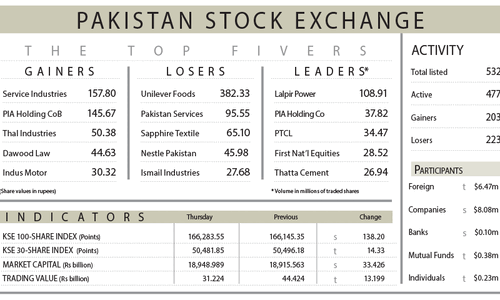 |
AS an economy grows, the role of services increases in the domestic value-added products and the export sectors.
Pakistan’s services sector has been growing at a considerable rate for the last few years; in fact, much faster than the entire commodity producing sector of the economy, which comprises agriculture, industry and manufacturing.
According to the Pakistan Economic Survey 2014-15, the share of the services sector in GDP growth was 2.89pc, against 1.78pc of the commodity producing sector.
According to the Pakistan Bureau of Statistics (PBS), services exports stood at $390.38m in April against imports of $655.67m; in April 2014, services exports were $380.18m against imports of $693.74m. The balance of trade worked out at a negative $265.29m for this April, a slight improvement from a negative $313.56m in April 2014.
Services are generally categorised as ‘traditional services’ or ‘personal services’ like government and transport services, and as ‘modern services’ like communications, banking, insurance, and business-related, remote access and call centre services etc.
As per IMF data, Pakistan still exports more traditional services relative to its regional partners. The export share of government and transport services was 43.5pc and 22.6pc in 2012-13 — much higher than the figures given for India, China and Indonesia
Modern services are those that can be easily traded across borders without any proximity between the buyer and the supplier. So, such services differ a great deal from traditional or personal services, in which face-to-face interaction is required.
According to the International Monetary Fund’s (IMF) balance of payments statistics, there are three broad categories of services — transport, travel and other commercial services (OCS). The last category includes financial, communications, construction, ICT-related, recreational and some other services.
As per IMF data, Pakistan still exports more traditional services relative to its regional partners. For example, the export share of government and transport services was 40.6pc and 30.7pc in 2005-06 and 43.5pc and 22.6pc in 2012-13 respectively. This is much higher than the figures given for India, China and Indonesia etc for the same time period.
It reflects that the value added by these two services in the domestic economy is also high, and therefore their services export share is higher as well.
As per the Pakistan Economic Survey 2014-15, the sub-sectors of transport, storage and communication services grew by 4.21pc and general government services by 9.44pc in the year. Other than these, wholesale and retail trade grew by 3.38pc, finance and insurance by 6.18pc, housing services by 4pc and other private services by 5.94pc.
The country has also improved its export performance in telecom, computer and information services, as the share of their exports surged from 8.2pc in 2005-06 to 12.6pc in 2012-13. This growth is much better than that of China, whose share in services exports was 3pc and 7.7pc for the same period respectively.
However, India has done way better than Pakistan in this regard and the share of these services exports in its overall exports stood at 43.4pc and 47.9pc for the same period.
Talking about diversifying trading partners in the services trade (extensive margin of trade), a recent World Bank study shows that Pakistan increased its new trading partners since 2006-07.
The study also revealed that India steadily lost its existing trading partners and had difficulty in adding new services’ importers. This may be due to various reasons. One of them may be the regulatory barriers or domestic enabling factors such as institutions or ICT infrastructure.
The World Bank study shows that Pakistan is over-trading with the US, Germany and Great Britain, but under-trading (low services’ exports from Pakistan) with India, Russia and Brazil.
So, there is a scope to increase our services exports to these countries. Pakistan also has the potential to improve its exports to its current trading partners with whom it trades less, like El Salvador, Cape Verdi and Kazakhstan.
The writer is a civil servant.
Published in Dawn, Economic & Business, June 22nd, 2015
On a mobile phone? Get the Dawn Mobile App: Apple Store | Google Play


































